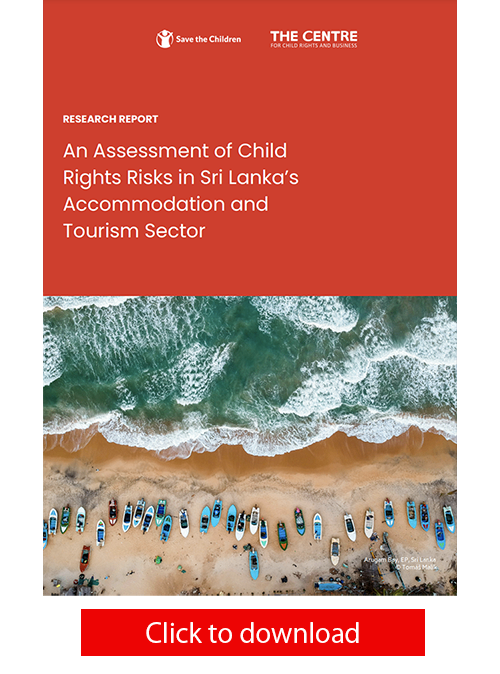
The Centre, with support from Save the Children Sri Lanka, has published a new study that examines child rights risks within the Sri Lankan tourism sector's accomodation supply chain.
Background - Why Focus on the Tourism Industry?
Two years after successfully launching the Mother and Child-Friendly Seal for Responsible Business in Sri Lanka’s tea sector, The Centre for Child Rights and Business is extending the programme to the country’s tourism sector – a vital pillar of Sri Lanka’s economy that is poised to expand significantly in the next few years. As an initial step, we conducted a comprehensive child rights risk mapping within the tourism sector’s accommodation supply chain to identify the needs, challenges and risks faced by children and families associated with this industry. The recommendations derived from this study’s findings will provide valuable input for development of the Seal initiative in the tourism sector, and will help inform its focus and priorities for businesses and stakeholders operating in this space.
Study Scope
 The qualitative study spanned five prominent tourism hotspots and incorporated interviews with stakeholders from accommodation establishments, government departments and civil society organisations. Additionally, focus group discussions with children and parents, supplemented by thorough desk research, provided a robust foundation for this study.
The qualitative study spanned five prominent tourism hotspots and incorporated interviews with stakeholders from accommodation establishments, government departments and civil society organisations. Additionally, focus group discussions with children and parents, supplemented by thorough desk research, provided a robust foundation for this study.
Key Findings
Our research found significant risks that children in the tourism supply chain face, including:
Child sexual exploitation and abuse
Child labour
Educational disruptions to education during tourism peak season
According to our findings, the key factors contributing to these risks are:
Inadequate regulations for supplementary accommodation establishments, particularly in guesthouses and homestays
Absence of child safeguarding protocols among tourist service providers
Lack or limited formal young worker programmes connecting youth to decent work opportunities
The study findings show that child sexual exploitation is linked to accommodation establishments and that there is a pressing need for these establishments to introduce stringent measures to prevent child abuse within their premises. There is also a notable mismatch between cases of child labour reported to authorities and the experiences shared by children and parents in local communities, highlighting the need for a thorough analysis of the true extent of child labour by authorities. Moreover, peak tourist season in some hotspots directly impacts children’s school attendance as families engage in short-term, tourist-related income-generating activities.
Recommendations and Next Steps
To safeguard children and uphold their rights, we recommended that accommodation establishments:
Strengthen recruitment practices to ensure rigorous vetting of staff
Undertake human rights due diligence of business partners
Develop adult and child safeguarding policies and provide training to all staff and service providers
Collaborate on initiatives that address child rights in the tourism sector
Introduce young worker programmes
Invest in family-friendly workplaces
With the Sri Lanka Tourism Development Authority (SLTDA) aiming to attract three million tourist arrivals in 2025, it is important for SLTDA and tourism service providers to implement responsible tourism measures and regulations to ensure this boost in tourism will not create adverse risks to children and their families. Collaborative action among accommodation establishments and their supply chains, government institutions and civil society organisations is essential to address root causes and enablers of child rights violations in the tourism sector. This will be crucial to ensure a sustainable and responsible tourism industry.
If you would like to learn more about our work in the tourism sector or have queries in relation to the above, please contact us.
Download the Study
By using this website, you agree to our use of cookies. We use cookies to provide you with a great experience and to help our website run effectively.